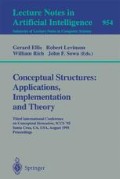Abstract
Knowledge systems as currently configured are static in their concept sets. As knowledge maintenance becomes more sophisticated, the need to address issues concerning dynamic concept sets will naturally arise. Such dynamics is properly called ontology revision, or in the simpler case, expansion. A number of sub-disciplines in artificial intelligence, philosophy and recursion theory have results that are relevant to ontology expansion even though their motivations were quite different. More recently in artificial intelligence ontologies have been explicitly considered. This paper is partly a summary of early results, and partly an account of ongoing work in this area.
Preview
Unable to display preview. Download preview PDF.
References
G. Boolos and R. Jeffery, “Computability and Logic”, 2ed, Cambridge University Press, 1980.
J.R. Buchi, “Turing Machines and the Entscheidungsproblem”, Math. Annalen, 148, 1962, pp 201–213.
R. Carnap, “Testability and Meaning”, Philosophy of Science, III, 1936, pp 419–471; IV, 1937, pp 1–40.
S.C. Kleene, “Finite Axiomatizability of Theories in the Predicate Calculus Using Additional Predicate Symbols”, Memoirs of the American Mathematical Society, no. 10,1952, pp 27–68.
R. Kwok and N. Foo, “Detecting, Diagnosing and Correcting Faults in a Theory of Actions”, Proceedings of the Second Automated Reasoning Day, Bribie Island, 1994, 5p.
J. Lloyd, “Mathematical Foundations of Logic Programming”, Springer Verlag, 1984.
R. Lyndon, “Properties Preserved Under Homomorphisms”, Pacific Journal of Mathematics, 9,1959, pp 143–154.
J. McCarthy, “Applications of Circumscription to Formalising Commonsense Knowledge”, Artificial Intelligence, 28, 1, 1986, pp 89–116.
S. Muggleton and R. Buntine, “Machine Invention of First-Order Predicates by Inverting Resolution”, Fifth International Conference on Machine Learning, 1988, Morgan Kaufmann, pp 339–352.
E. Nagel, “The Structure of Science”, Routledge and Kegan Paul, 1961.
J.R. Quinlan, “Learning Logical Definitions from Relations”, Machine Learning, vol.5, no. 3,1990, pp 239–266.
R. Reiter, “Nonmonotonic Reasoning”, Annual Review of Computer Science, 2,1987, pp 147–186.
E. Sandewall, “Features and Fluents”, Oxford University Press, 1994.
E. Shapiro, “Inductive Inference of Theories from Facts”, TR 192, Dept of Computer Science, Yale University, 1981.
W-M. Shen and H.A. Simon, “Fitness Requirements for Scientific Theories Containing Recursive Theoretical Terms”, British Journal of Philosophy, 44,1993, pp 641–652.
I. Stahl, “On the Untility of Predicate Invention in Inductive Logic Programming”, Proceedings of the European Conference on Machine Learning, ECML-94, 1994, pp 272–286.
CL. Chang and R.C.T. Lee, “Symbolic Logic and Mechanical Theorem Proving”, Academic Press, 1973.
K. Clark, “Negation as Failure”, in Logic and Databases, ed. H. Gallaire and J. Minker, Plenum Press, 1978, pp 293–322.
W Craig, “On Axiomatizability Within A System”, The Journal of Symbolic Logic, vol. 18, no. 1, pp 30–32.
W. Craig and R.L Vaught, “Finite Axiomatizability Using Additional Predicates”, The Journal of Symbolic Logic, vol. 23, no. 3, pp 289–308.
H. Enderton, “A Mathematical Introduction to Logic”, Academic Press, 1972.
N. Foo, “Comments on Defining Software by Continuous Smooth Functions”, IEEE Transactions on Software Engineering, vol. 19, no. 3, 1993, pp 307–309.
N. Foo, “How Theories Fail — A Preliminary Report”, Proceedings National Conference on Information Technology, Penang, Malaysia, 1991, pp 244–251.
N. Foo and T. Tang, “An Inductive Principle for Learning Logical Definitions from Relations”, Proceedings of the Seventh Australian Joint Conference on Artificial Intelligence, World Scientific Press, 1994, pp 45–52.
N. Foo, B. Garner, A. Rao, and E. Tsui, “Semantic Distance in Conceptual Graphs”, in “Current Directions in Conceptual Structure Research”, (eds) P Eklund, T Nagle, J Nagle and L Gerhotz, Ellis Horwood, 1992, pp 149–154.
H. Gaifman, D. Osherson and S. Weinstein, “A Reason for Theoretical Terms”, Erkenntnis, 32, 1990, pp 149–159.
P. Gardenfors, “Knowledge in Flux”, Bradford Books, MIT Press, 1988.
G. Gibbon and N. Foo, “Predicate Discovery in a Model Identification Framework”, Proceedings of the Sixth Australian Joint Conference on Artificial Intelligence, World Scientific Press, 1993, pp 65–70.
G. Gibbon and N. Foo, “A General Framework for Concept Formation”, Proceedings of the Seventh Australian Joint Conference on Artificial Intelligence, World Scientific Press, 1994, pp 53–59.
C. Hempel, “Fundamentals of Concept Formation in Empirical Science”, International Encyclopedia of Unified Science, vol. 2, no. 7, University of Chicago Press, 1952.
Author information
Authors and Affiliations
Editor information
Rights and permissions
Copyright information
© 1995 Springer-Verlag Berlin Heidelberg
About this paper
Cite this paper
Foo, N. (1995). Ontology revision. In: Ellis, G., Levinson, R., Rich, W., Sowa, J.F. (eds) Conceptual Structures: Applications, Implementation and Theory. ICCS 1995. Lecture Notes in Computer Science, vol 954. Springer, Berlin, Heidelberg. https://doi.org/10.1007/3-540-60161-9_26
Download citation
DOI: https://doi.org/10.1007/3-540-60161-9_26
Published:
Publisher Name: Springer, Berlin, Heidelberg
Print ISBN: 978-3-540-60161-6
Online ISBN: 978-3-540-49539-0
eBook Packages: Springer Book Archive

